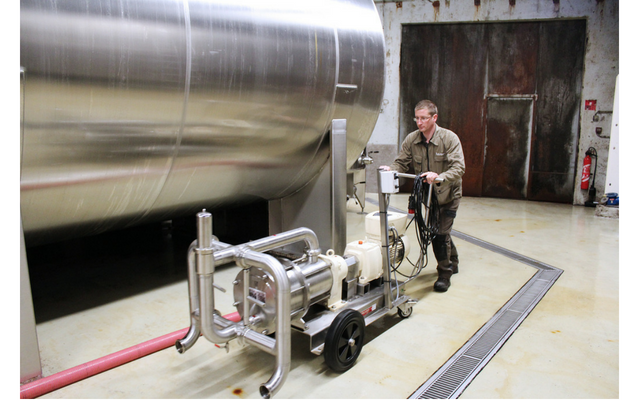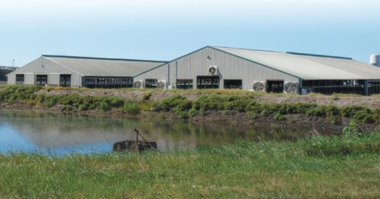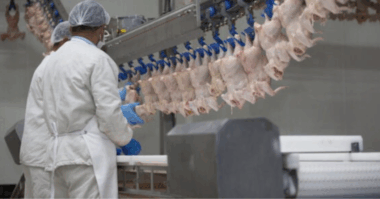Author: Vincent Lejeau
Located in the winemaking Yonne Valley near the village of Saint-Bris-le-Vineux, France, Bailly Lapierre is one of the leading producers of Crémant de Bourgogne, a white or rose sparkling wine made predominantly from Pinot Noir and Chardonnay grapes. As is the case with many European wineries and vineyards, Bailly Lapierre exudes history and tradition. Not only can the company’s origins be traced back to the late Roman Empire when vineyards first began to flourish in the region, but its day-to-day operations are situated 50 meters (165 feet) underground in an ancient quarry that supplied the stone for some of the greatest works in France’s architectural heritage: the Pantheon, Notre-Dame de Paris and Chartres Cathedral. And if this wasn’t enough history, the location was also used as a German airplane hangar during World War II and as a mushroom-cultivation center until 1970.
Inheritors of a very long wine-growing tradition, the local men and women who founded Bailly Lapierre first combined their wine-making efforts in 1972 in order to begin producing Crémant de Bourgogne. Since then, Bailly Lapierre has brought together 430 winegrowers, and more than 70 wine-growing families who devote themselves to the vines year round to ensure the grapes ripen in the best possible conditions. In spring and summer, these families trim the canopy and debud the old wood, and as summer turns to autumn, they harvest the grapes by hand and bring them to the caves of Bailly Lapierre, their mutually owned company.
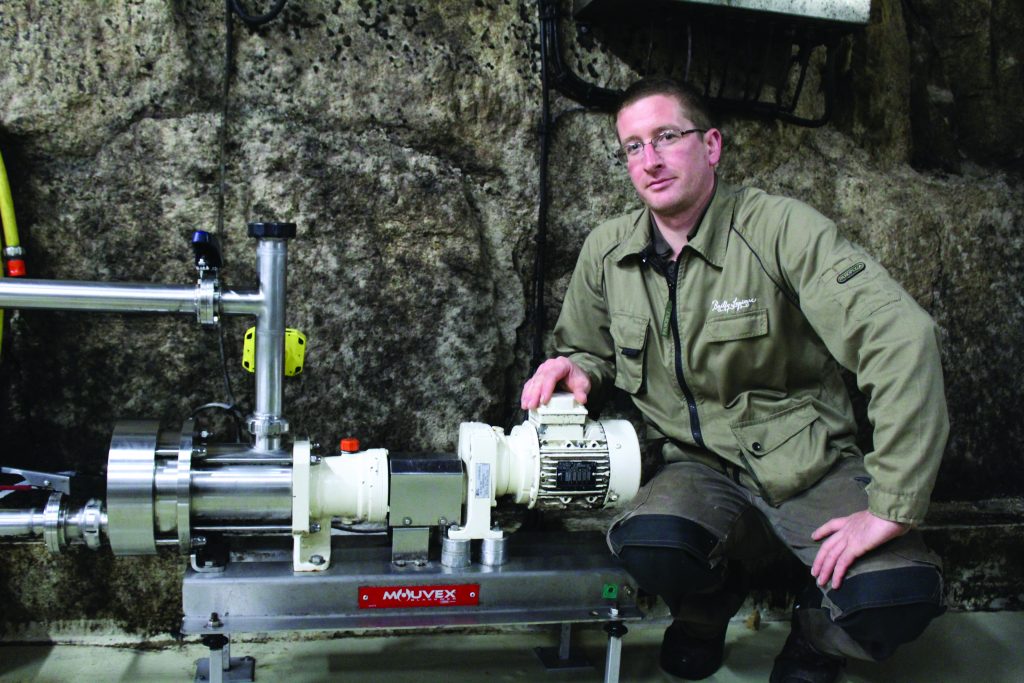
Producing more than 3.5 million bottles of Crémant de Bourgogne annually, Bailly Lapierre is one of the leading producers of Crémants in the world. To maintain this lofty status, the winery, and its cellarman Mathieu Cerveau, rely on Mouvex® SLS Series Eccentric Disc Pumps for all their critical wine pressing, transfer and bottling applications.
Not only is Bailly Lapierre surrounded by history, but it is also a company surrounded by success. Great success in fact. The average annual production of Crémant de Bourgogne is nearly 3.5 million bottles (25,000 hectoliters) or roughly 290,000 cases. Additionally, a permanent stock of five million bottles is always on hand in the company’s underground cellar to help ensure that the quality remains constant. Bailly Lapierre also benefits from an appellation d’origine controlee (A.O.C.) (a certificate of quality from the French government) that attests to its outstanding level of excellence. And when speaking of quality, a large number of awards have confirmed the superiority of the product, resulting in an ever-growing recognition worldwide, with one out of every three bottles sold abroad, most notably in the United States, Germany and Great Britain.
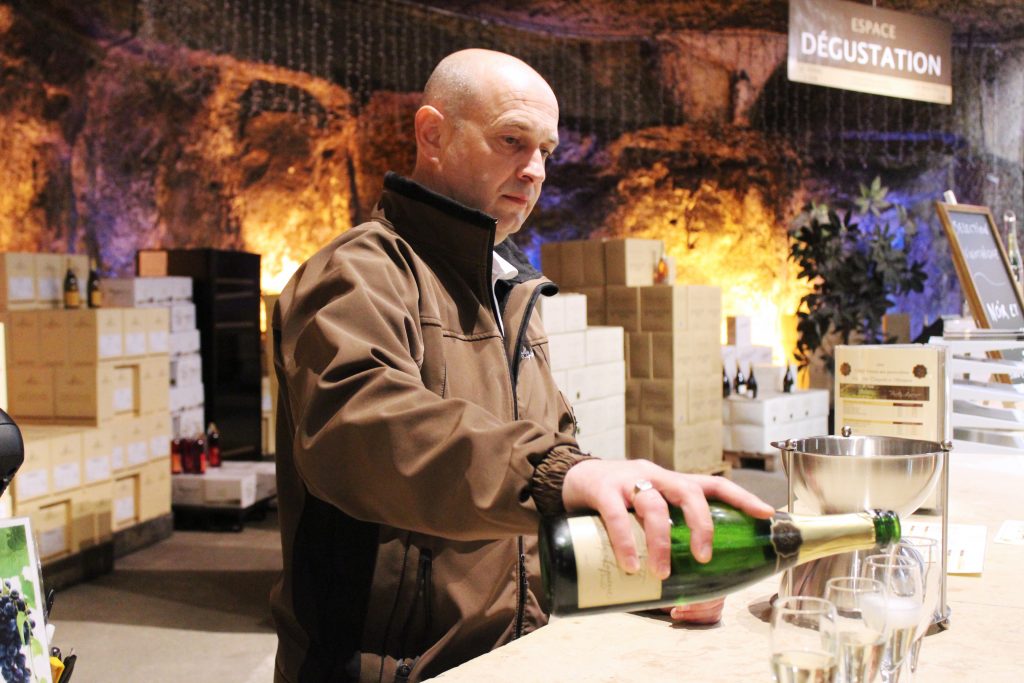
While Bailly Lapierre’s underground facility creates a beautiful atmosphere for a tasting room, it also provides unique natural conditions that are ideal for the production of Crémants., In the tasting room, Bailly Lapierre’s Crémants are poured by Bruno Denis.
A Traditional Process
With subterranean galleries that extend more than 10 acres, the historic and clandestine location of Bailly Lapierre’s winery not only creates a beautiful atmosphere for a tasting room, but also serves the company well in its winemaking efforts since caves provide unique natural conditions that are ideal for the production of Crémants:
- A naturally cool temperature at a constant 12°C (54°F), ideal for maturing and ageing
- A naturally high level of moisture (about 80% humidity at the heart of the cellars)
- Soft diffused light that helps preserve the flavor and color of fine wines
However, an ideal location for a winery is not enough to produce the perfect sparkle that Bailly Lapierre’s Crémants are known for worldwide. The key to any success comes down to two things: all of the painstaking work that takes place in the vineyards before the wine is even produced, and the company’s eagerness to implement new and innovative equipment into its operation.
“It’s the quality of our grapes and the year-long efforts of our winegrowers that create the perfect flavor of our Crémants,” said Mathieu Cerveau, cellarman at Bailly Lapierre. “So when we produce our wine, the goal is to retain in every bottle the inspiration of each winegrower as if they were overseeing each stage of production themselves. Therefore, we treat every step of the process with the utmost care.”
The initial work that takes place in the vineyard needs to be a patient and methodical process. This is also the case for the work that occurs once the grapes are hand picked and transported inside the caves of Bailly Lapierre.
Once inside the winery, the grapes are weighed and the quality of the berries accessed. From this information, the grapes are emptied into the designated hopper and channeled to the corresponding press. The presses, which were entirely renovated in 2007, were designed to ensure that the process is completed in the gentlest way possible.
“We have four presses with different capacities, between six- and 12-metric tons,” said Cerveau. “Thanks to this setup, we can press an average of 250 metric tons a day, with each press devoted to a single grape variety. Completing the pressing process in a gentle manner is important because the difference juices need to be kept apart. The cuvée (the juice from the initial pressing) is run into separate tanks from the subsequent pressings, or taille. It is also very important that we are able to drain all of the juice from the piping system. This juice is the lifeblood of the wine.”
After the pressings take place, Bailly Lappiere makes its Crémants using the traditional method, which is the same method used for making Champagne. Known as “vinification,” it is a long process that demands rigor and precision. At this time, the yeast and malolactic fermentations take place, and the blending and bottling are carried out.
Once bottling – which begins at the onset of winter and does not stop until the end of spring – has been completed, the extended maturing process begins. For an average of 16-18 months, the bottles are placed in special bins that have a rotating base, ensuring that the necessary slight turning movement is kept regular and automatic. This occurs in the coolness and half-light of Bailly Lapierre’s underground cellars. It is during this period that the wine’s natural sparkle develops.
After a few additional treatments, such as removing the yeast deposit from the neck of the bottle and adding some grape sugar to the concoction, the wine is left in the cellar to refine. After a few months, the wine is ready to drink.
Old Dog, New Tricks
While its Crémant de Bourgogne is produced in the traditional fashion, Bailly Lapierre still prides itself on being a company of innovation. Within the last decade, the company has completely overhauled its production facility, installing state-of-the-art equipment that includes a variety of modern and automated machines. Not only does this new equipment make the production process easier to complete, it also does so in a more precise and worry-free manner.
“Some of our newer equipment was custom built specifically for us,” explained Cerveau. “We use stainless-steel equipment as well. We do this for a variety of reasons, but one reason is because stainless steel is easier to clean. In addition, all of the equipment that touches the wine must be compatible with food products because making wine needs to be a flawless and hygienic process.”
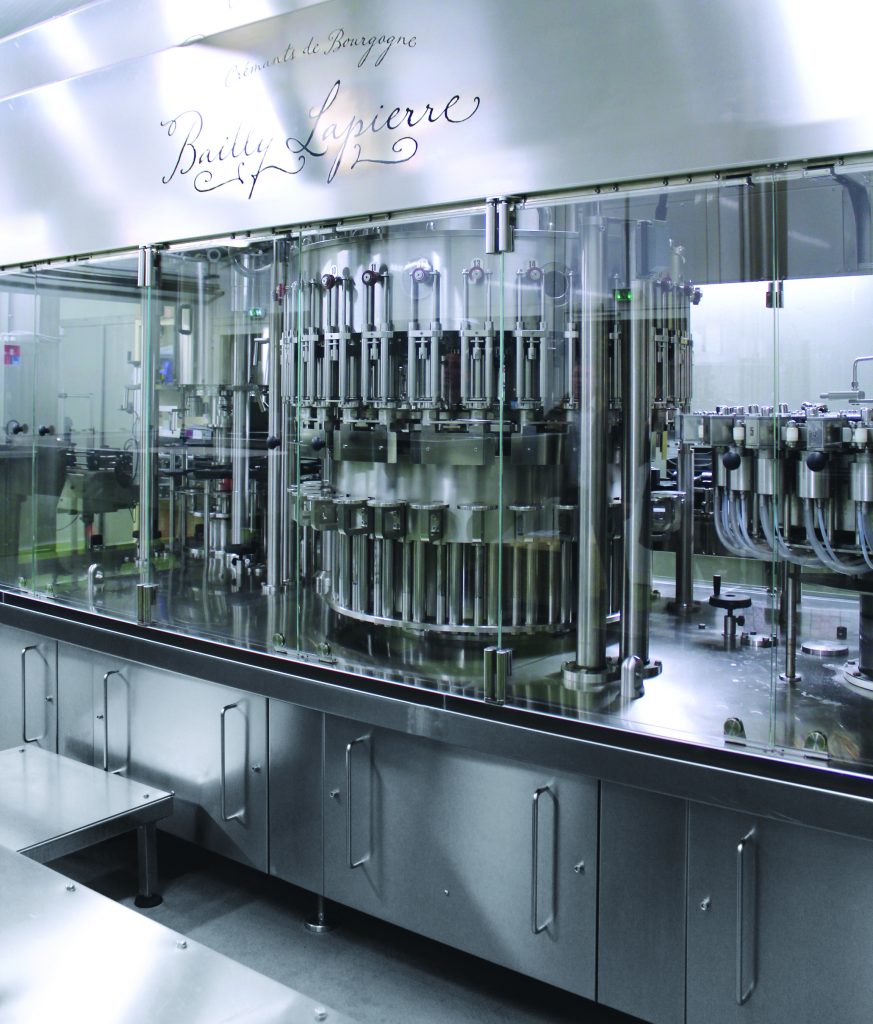
Much of Bailly Lapierre’s success can be attributed to the company’s eagerness to implement new and innovative technology into its winemaking operation, including state-of-the-art automation equipment.
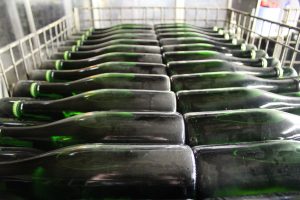
The making of Crémant de Bourgogne is a complicated process and must be handled by equipment suitable for the task. This includes the pumping equipment utilized for a variety of applications throughout the winery.
When speaking specifically about the type of equipment that Bailly Lapierre utilizes, one piece of equipment that plays a major role in producing its Crémants are the pumps that the winery uses for a variety of applications during the winemaking process.
“Pumps are very importation pieces of equipment for us,” said Cerveau. “Because we use our pumps in a variety of locations, we usually have a few that are mounted on a mobile cart so we can easily move them around the winery. We use them in our pressing center, where it’s a 24/7 operation, as well as around the winery to fill tanks or transfer wine from one tank to another. In addition, we use a pump to fill all of our wine bottles. If our pumps go down, the operation stops.”
When selecting pumps, wine producers like Bailly Lapierre must choose a pumping technology that has the following attributes: gentle product handling, volumetric consistency, ability to recover expensive products and ingredients, and low slippage. Therefore, after evaluating a wide variety of pumping technologies, Bailly Lapierre chose to install SLS Series Eccentric Disc Pumps from Mouvex®, Auxerre, France, a product brand of PSG®, a Dover company, Oakbrook Terrace, IL, USA.
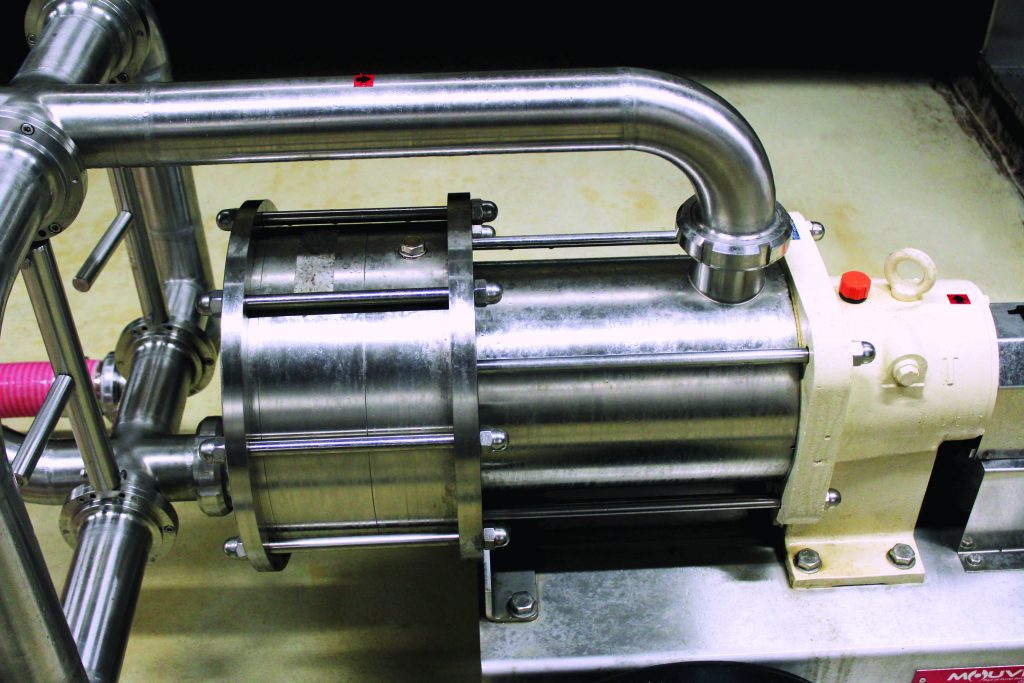
When selecting pumps, wine producers must choose a pumping technology that possesses the ability to recover expensive products and ingredients from the tank and piping systems. This is why Bailly Lapierre chose to install Mouvex® SLS Series Eccentric Disc Pumps.
SLS Series pumps have been specifically designed for use in the food-and-beverage industry, which requires extremely hygienic operations. What sets the SLS Series apart is an innovative seal-less design that incorporates a hermetic pump head with a self-adjustable eccentric shaft protected by a double-wall stainless-steel bellows that ensure long life and product safety. Mouvex pumps also reduce the risk of product contamination and costly leakage thanks to the way they are constructed, eliminating mechanical seals, packing and magnetic drives. This design has helped SLS Series pumps earn certification from EC 1935/2004, EHEDG, 3A and FDA for use in food-processing applications.
In addition to these advancements, SLS Series pump offer a range of innovative benefits, including strong vacuum and compression effect for enhanced line stripping and optimized product recovery; low shear rate; self-priming and dry-run capabilities; exceptional volumetric consistency; no slip; and almost completely pulsation-free operation. Due to the fact that the pump has only two wear parts, maintenance is easy and can be performed while the pump is inline.
“Mouvex pumps have many benefits for us,” explained Cerveau. “The high flow rates are a key feature; since we deal with big volumes of liquid, we need a big flow. Another great feature is the strong suction. Because the pump is located in the pressing area, it has to suck the liquid from a lower level and send it through about 40 meters of piping. This isn’t possible with some other pumps. Additionally, just as we have designed our presses to handle the grapes as gently as possible, we love the fact that Mouvex pumps feature no excessive shear that puts friction on the wine. But the best benefit for us is the higher rate of product recovery. The Mouvex pump can completely drain all of the juice from the piping and from inside the tanks.”
A key to the Mouvex pump’s enhanced product-recovery capability is its unique conveying principle. This principle is based on two stainless-steel components – the static cylinder and the moving piston – driven by an eccentric shaft, which generates a circular movement. Through this movement the inner and outer chambers are formed, which displace the liquid from the suction side to the discharge side with an impressively consistent and accurate flow. Given that the pump can run dry, the rotation of the parts creates a compressor effect that facilitates the stripping of discharge lines.
“The Mouvex pump is the most efficient solution to totally drain our piping, not only for our pressing operation, but for transferring and bottling, as well,” said Cerveau. “The pump can easily push all of the wine out of a tank and into our bottling workshop.”
While Bailly Lapierre is a company that relies on history and tradition to bring its award-winning Crémant de Bourgogne to the masses, it’s also not afraid to implement new and innovative technology into its operation. This new technology not only makes life easier for those involved, but also helps ensure that each batch of Crémant sparkles in just the right way. So, luckily for Bailly Lapierre, it found a local pump company in Mouvex that not only manufactures innovative pump technology, but also has a long-standing tradition of quality and reliability (Mouvex celebrated its 110-year anniversary in 2016!).
“Overall, we are extremely happy with the Mouvex pumps,” said Cerveau. “We produce between four and five million bottles of wine each year, and a Mouvex pump fills each and every one. We wouldn’t be able to operate without them.”
Mouvex® SLS Series Pumps Ideal Solution for Wine Applications
About the Author:
Vincent Lejeau is the Regional Sales Manager – France for Mouvex® and PSG® and can be reached at Vincent.Lejeau@psgdover.com. Auxerre, France-based Mouvex was incorporated in 1906 and is a leading manufacturer of positive displacement pumps, screw compressors and hydraulic coolers for use in the refined-fuels, oilfield, energy, food/sanitary, military, transport and chemical-process industries, and is a product brand of PSG®, a Dover company. Headquartered in Oakbrook Terrace, IL, USA, PSG is comprised of several leading pump brands, including Abaque®, Almatec®, Blackmer®, Ebsray®, EnviroGear®, Finder, Griswold™, Mouvex®, Neptune™, Quattroflow™, RedScrew™ and Wilden®. For more information on Mouvex or PSG, please go to www.mouvex.com or www.psgdover.com.

